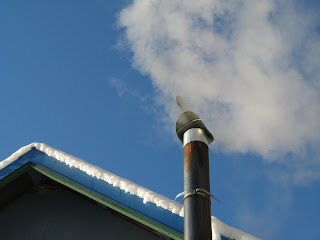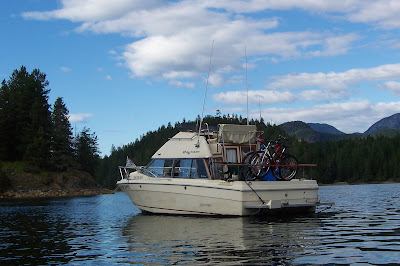2008 Retrospective from Powell River Books
 2008 was a great year for Wayne, me, and Powell River Books. Here are a few exciting moments:
2008 was a great year for Wayne, me, and Powell River Books. Here are a few exciting moments:
January - Two of Wayne's books (Up the Lake and Up the Strait) are released in Kindle format. After the holidays in the States, we returned to our beloved float cabin on Powell Lake.
February - After almost a two year wait, Wayne and I received our Canadian permanent residency. Back at the cabin, I learned to bake bread inside my woodstove.
March - Up the Airway is launched at Cole's bookstore. Low water levels on Powell Lake expose "treasures" from early 20th Century logging cabins and camps. Powell River Books joins YouTube with several videos.
April - Bumblebees make a home in daffodils in my newly planted garden and Wayne and I go to Comox to see the Canadian Forces Snowbirds Demonstration Flight Team put on their annual free show.
May - Our airplane 997 takes us on a flight to the San Juan Islands. Back at the cabin, spring birds include Crossbills, Swallows and Canada Geese and we join the ATV Club for the annual Nanton ride.
June - My floating garden produces lots of vegetables and Mr. Float Cabin heads "up the lake" on a book tour. Back in Bellingham, I meet Betty, my blog's most faithful reader, in real life.
July - Our cabin gets a boost from twenty blue barrels. Book signings take us to the Texada Airport Fly-in, Sea Fair and a book launch for Farther Up the Lake at Breakwater Books. For fun, we join the ATV club on a Poker Ride.
August - Slide show tours take us to Gibsons, Sechelt, Powell River Library, Bellingham Museum of Flight, Chilliwack Air Show and Blackberry Festival. Halcyon Days takes us on a cruise to meet Dave and Marg at the lodge.
September - I pick and store onions, potatoes and tomatoes. Our float cabin is highlighted in an article in Our Canada magazine and Wayne gets a flood of e-mail.
October - Fall colours make Powell Lake beautiful and I invent Margy's Mouse Mechanism to keep little critters off the float. Wayne and I set up a booth again at the Powell River Newcomer Social.
November - Our float cabin is showcased on Tiny House Blog. PRB is honoured at the Horizon Business Awards and Wayne is nominated as an entrepreneur of the year. Best of all, we get lots of time at the cabin. December - Snow, snow and more snow - and lots of really cold weather. We get a new chimney cap and use our wood stove almost 24/7. The PRB blog had a great year with over 21,750 visitors.
December - Snow, snow and more snow - and lots of really cold weather. We get a new chimney cap and use our wood stove almost 24/7. The PRB blog had a great year with over 21,750 visitors.
It's been a great year and I've had fun sharing it with you. Wayne and I wish you and your family a happy new year. May it bring you peace, love and contentment. -- Margy




































































